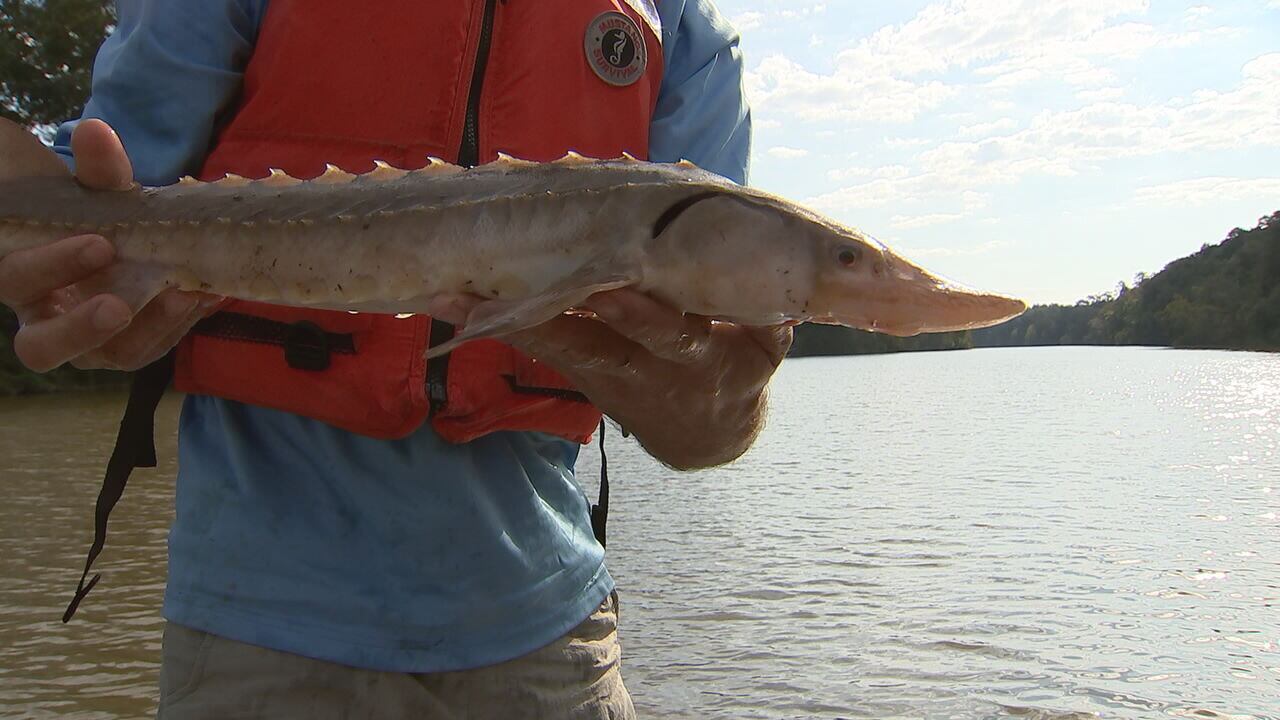Researchers with the University of Georgia are working to a fish back to local rivers. The fish can live to more than 100 years and looks like something out of Jurassic Park.
Lake Sturgeon can grow to several feet in length. Once native to our area, overfishing and environmental issues depleted them from Georgia waterway
Severe Weather Team 2 Chief Meteorologist Glenn Burns has learned that a decades-long effort could be successfully bringing back these fascinating fish.
The prehistoric-looking fish disappeared from Georgia waterways more than 60 years ago.
Since then, researchers like Dr. Martin Hamel with UGA’s Warnnell School of Forestry and Natural Resources, have worked to restock the population in Georgia, depleted largely due to over-harvesting.
“The eggs are caviar and a lot of individuals will try to either take that to sell it some will eat it themselves,” Hamel said.
“When I think of Georgia, I don’t really think of sturgeon,” Burns told Hamel.
“Yeah, it’s kind of unique. We are actually the southernmost branch of the lake sturgeon range,” Hamel said.
Burns joined Hamel’s team on the Coosa River in Floyd County. The team set up two nets the night before to tag and study any sturgeon and they may catch.
“They have these bony scoots on the outside as a kind of armored protection,” Hamel said. “If we see one, they are actually quite sharp.”
Burns helped pull in the first net. Inside were some fish, but no sturgeon.
“We do a lot of this, where we set nets and we may not capture one but it still provides a lot of information for us,” Hamel said.
Hamel said their chances of capturing a sturgeon in the Coosa were very rare. This summer, researchers set more than 170 nets and recorded about 20 of them. They moved on to the next net, just up the river.
Lake sturgeon reproduce late. It takes them up to 20 years to sexually mature. That’s if they survive that long.
The fish in the Coosa River came from eggs in Wisconsin, where sturgeon can grow to more than 100 pounds.
“They put the fertilized eggs into the incubation systems, drive it all the way back down to Georgia where they put them in the hatchery and continue to hatch out the little guys and grow them to a sufficient enough size so they can place them in the rivers,” said Margaret Stadig with the Wisconsin Department of Natural Resources
The fish species can live up to 150 years old, which means it will take generations of people to study this fascinating fish.
“This is one of those long-term processes where you just have to have faith,” Stadig said.
Back on the boat, time and netting were running out. That’s when their luck changed – and they caught a sturgeon. The fish was estimated to be about 3 years old.
Graduate research assistant Savannah Perry gave Burns an up-close look at the fish.
After examining the sturgeon, the research students implant the fish with approved tracking devices.
“We have an antenna that picks up on the receiver and it will beep when we get near it,” Perry said. “So we put the tag up under one of these dorsal scoots.”
Research student Matt Phillips then showed Burns how he tagged the fish with a small injection.
The team measures, weighs and records their lucky find then releases it back into its home in the Coosa River with hopes that soon we’ll see an even larger population everyone can enjoy
“They’re going to be a sought-after fish by anglers,” Phillips said.
Once restocked, researchers will work with the Georgia Department of Natural Resources to come up with rules and seasons for fishing sturgeon.
Right now, they are on the protected list in Georgia.
Nothing will stop you from catching the fish, but researchers told Burns you should release them back into the water as soon as possible.
©2022 Cox Media Group






